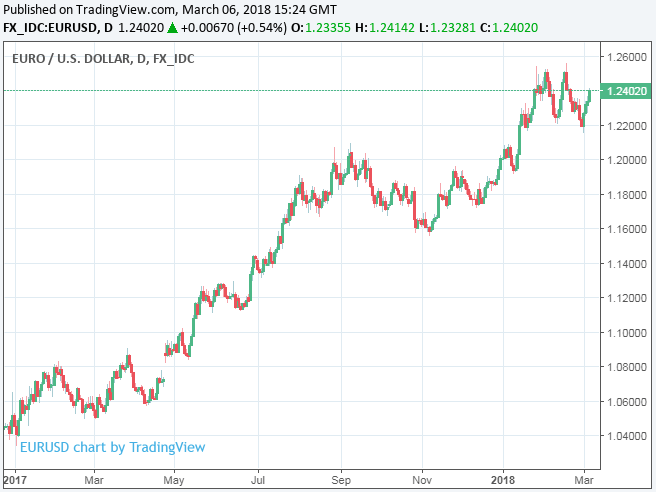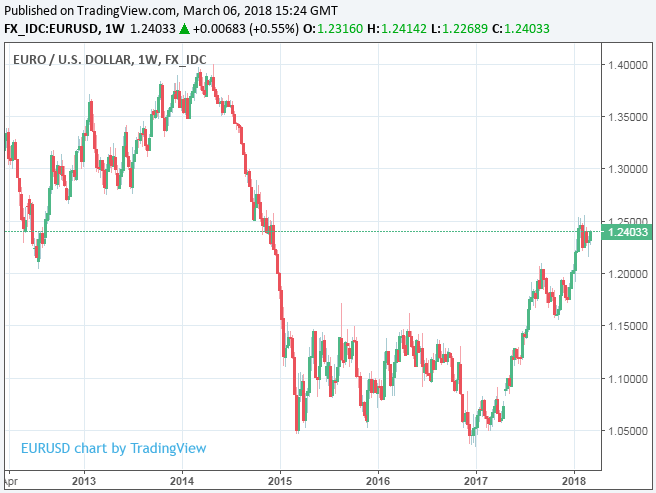Euro-to-Dollar Rate Seen Moving Lower as Eurosceptics Stalk Continent Again
- Written by: James Skinner

© Stadtratte, Adobe Stock
Italy’s vote has thrust national and supranational divisions and angst over the future political direction of Europe back out into the open after a year-long period of calm. Here's what it means for the Euro:
The Euro is likely to see its gains over the Dollar capped in the coming months as the reintroduction of European political risk into the thinking of investors raises downside risks for the currency, according to analysts at Barclays.
Barclays’ forecast comes after Sunday’s Italian general election saw anti-establishment parties sweep the board, with the Five Star Movement and Lega both adding substantially to their share of the electorate and now boasting more than 50% of all votes when combined together.
“Including Fratelli d’Italia (FdI), another eurosceptic party, alternative, sovereignist parties captured 54% of the total vote,” says Marvin Barth, head of FX strategy at Barclays.
“Whether these parties can find enough common ground in their euroscepticism to form a government – or whether any constellation of Italian parties can form a stable government – will dictate how serious the sovereignist risk is in Europe.”
Pro-European and establishment parties, best embodied by Matteo Renzi’s Democrats (PD), were routed Sunday in a wholeheartedly convincing defeat equal to that experienced by France’s major parties in the presidential election of 2017.
Renzi’s PD slumped to around 19% in the latest vote, down from the 30% it secured in the 2013 general election and substantially below the 40% won in the European elections of 2014.
Sunday’s vote has now given way to what many expect will be a months-long period of negotiations over possible coalitions, which is almost sure to see one of the two main anti-establishment parties assume the leading role in an eventual government.

Above: EUR/USD shown at daily intervals.
Advertisement
Get up to 5% more foreign exchange by using a specialist provider to get closer to the real market rate and avoid the gaping spreads charged by your bank when providing currency. Learn more here.
Reforms Rolled Back or Downsized
The rub for markets is that both Five Star and Lega have pledged to cut taxes and increase government spending, which puts them on a collision course with fiscal technocrats at the European Commission. This could also leave post-crisis reforms of pension and labour market rules vulnerable to rollback.
“We have highlighted that retreating concerns about fiscal sustainability in the periphery countries played an important role in the Euro’s rally in the last year,” Barth writes, in a note Tuesday.
“If the incoming Italian government undermines that optimism, it likely will reintroduce some risk premium in the Euro. In that sense, we expect that the Eur may increasingly take its cues from BTP spreads to bunds.”
BTPs are Italian government bonds and bunds are German government bonds. The “spread” refers to the difference in yield between Italian and German bonds, while changes in the spread represent changes in investors’ perceptions of risk and economic performance across both nations.
If the yield spread widens because investors are demanding more compensation for holding Italian debt, this would likely signal increasing perceptions of risk attached to Italy and could be bad for the Euro.
In the short term, Sunday's election endangers post-crisis reforms while an associated rise in borrowing costs could pose a threat to Italian financial stability if spending were to resume apace once a new government is installed.
Long term, many economists claim that Italy and the Eurozone’s growth rates could suffer as an increasingly sovereignist Europe spurns further integration and federalisation, in favour of local government and national sovereignty.
This longer term aspect gets right to the heart of the issues at play not just in the Italian election Sunday, but also in the minds of investors across the continent.
European Integration Hits Road Block
Italy’s vote has thrust national and supranational divisions, as well as angst over the future political direction of Europe back out into the open after a near year-long period of calm.
It is noteworthy that both the Five Star and Lega parties have previously pledged to hold referendums on Italy’s continued use of the Euro.
Five Star has said it will keep the Euro referendum card up its sleeve in case its plan to renegotiate Eurozone budget deficit rules draws a blank.
“The increasing risk to the EU’s long-term health from Italy is, in part, offset by the formation of a German grand coalition government that has explicitly endorsed ESM reform and greater contributions to the EU budget,” says Barth.
“But the resignation of Martin Schultz as SPD leader (and prospective foreign minister) and the recent shift towards sovereignist parties in recent German polling suggest that there still are limits to German delegation of sovereignty that may fall short of ‘ever closer union’.”
Hopes of more political integration were key to forecasts of faster long term growth in Europe but the prospect of this was buffeted not just in Italy, but also in the Netherlands during the last week.
Dutch Prime Minister Mark Rutte used a speech Friday to strike down the idea that EU membership should be a one way ticket to a proverbial United States of Europe.
“There has been this narrative that there is this inevitability of closer cooperation in a European federal state. This horrible language about ‘ever closer Union’ I don’t like,” Reuters reported Rutte as saying, to an audience of diplomats.
“In the past 20 or 30 years this has moved from ever closer union of the peoples of the EU working together on collective issues where member states weren’t able to deal with it themselves, to become an inevitable goal in itself.”
Barclays’ Barth wrote Monday that a Eurosceptic government in Italy would likely reinforce political resistance among North European countries to the push for a federalised continent.
“Taken together, these developments highlight the long run risks to EU stability and growth” Barth says. “After a year in which the Euro appreciated strongly, in part due to reduced perceptions of European political risks, the reintroduction of two-way risks in European politics likely will cap further Euro gains and introduce downside risks.”
Barclays forecast the Euro-to-Dollar rate will soon break down into the lower end of the 1.16 to 1.26 trading range they flagged for it back at the beginning of the year.
The Euro-to-Dollar rate was quoted 0.46% higher at 1.2394 during noon trading on Tuesday. It is up 3.33% for the year to date and has risen more than 17% in the last 12 months alone.

Above: EUR/USD rate shown at weekly intervals.
Trade War Poses Further Risk
Barth’s prediction comes as the world waits with bated breath to hear of US President Donald Trump’s move after he announced last week that new tariffs will be levied on imports of aluminium and steel into the US.
“While the economic literature is inconclusive on the effects of tariffs on FX, under our framework the depressing effects of taxes on trade on productivity and economic growth, and thus returns to capital, imply a net negative impact for the imposing country’s currency, at least in the long run,” the strategist notes.
President Trump cited unfair competition and the need to protect the US steel industry on the basis of its importance for national security when announcing the tariffs.
However, the move has given rise to threats of retaliation from officials in the European Commission and elsewhere in the world, leading to fears of a possible trade war.
The exact extent to which the Euro-to-Dollar rate falls in the months ahead will depend largely upon whether the trade spat escalates further, or if it is resolved. Any continued threat of a trade war may boost the Dollar in the short term, thereby weakening the Euro-to-Dollar rate, while a de escalation might reduce some of the pressure on the EUR/USD rate.
“As the currency of the world’s largest economy and consistent leader and instigator of the global movement towards freer trade for more than half a century, the USD ultimately may be the beneficiary of a trade war, ironically,” Barth says.
“As a large, largely domestically oriented economy, the US is better insulated than most economies from global trade shocks, even if it is the instigator.”
Advertisement
Get up to 5% more foreign exchange by using a specialist provider to get closer to the real market rate and avoid the gaping spreads charged by your bank when providing currency. Learn more here.




